Vaccination Time Again-Keeping Your Puppy Healthy
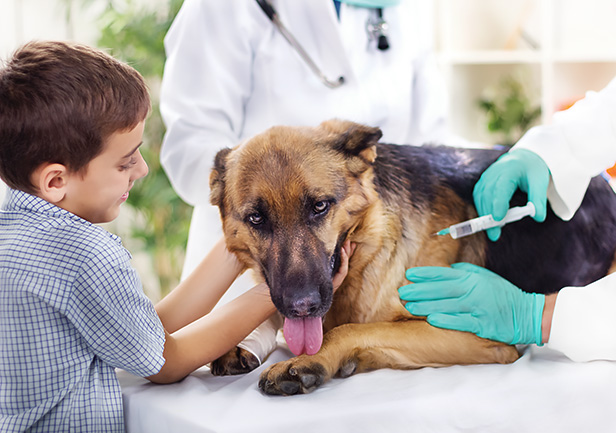
Most breeders and pet stores won’t allow a puppy to leave the litter until the puppy has been weaned at six weeks. This is usually the youngest you can take your puppy home and it also coincides with the first treatments you should get for your puppy.

The First Shot is for DHPP
Distemper/Hepatitis/Parainfluenza/Parvovirus.
This shot should be administered at six to seven weeks of age.
Distemper is one of the major causes of death for dogs. Distemper is a highly infectious disease caused by a virus and can be spread through the air or through physical contact. Distemper will kill 80 percent of the puppies that contract it.
Hepatitis is another viral disease that can kill dogs if not treated promptly. The shot will immunize your puppy from this virus. Parainfluenza is also called greyhound disease, race flu and canine influenza virus.
This is a respiratory infection and spreads easily from dog to dog. Your puppy will be protected from this disease with this first shot at six weeks of age. Parvovirus is another disease that can kill unvaccinated puppies.
As the name tells you, it is another virus and affects puppies more often than adult dogs. Parvovirus remains in the soil for months. All four of these viral diseases are addressed with the DHPP shot.
Allergic reactions to the DHPP shots are usually mild or temporary. Watch the location of the shot for swelling, abscesses or hair loss. Lethargy, diarrhea and loss of appetite are systemic reactions, along with difficulty breathing, lameness and behavioral changes. The most serious adverse reactions are seizures, organ damage, brain damage and death.
Allergic reactions will generally occur soon after the shot is administered. Watch your puppy closely for the first half hour after the first shot to make sure there are no reactions. It may be a good idea to remain at the vet’s office for the first half hour.
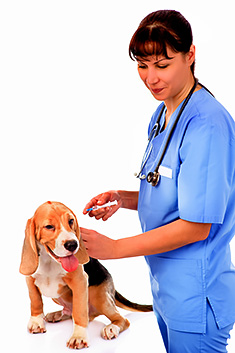
Six to Seven Weeks Dewormed
At the same time as the first DHPP shot – six to seven weeks – you need to get your puppy dewormed. Canine intestinal worms are parasites that can affect your puppy’s overall health and even prove fatal.
A second DHPP shot should be administered at nine to ten weeks of age. This is also when you will want to give your puppy the second deworming. If your puppy had no allergic reaction to the first DHPP shot, there should be no adverse reactions to this one.
12-13 Weeks Busy time!
Twelve to thirteen weeks of age – four months old – is a busy time for your puppy.
At twelve to thirteen weeks your puppy gets the third DHPP shot with the addition of a vaccination for leptospirosis. This makes it a DHLPP shot.
Leptospirosis is contracted when your puppy sniffs the urine of infected vermin, is exposed to contaminated water – by wading through or drinking – or by eating infected material. Leptospirosis affects the kidneys and liver of dogs and other animals.
Allergic reactions to the Leptospirosis vaccine are rare, ranging from mild – pain or sensitivity at the injection site – to a severe anaphylactic response. Anaphylactic reactions include vomiting, seizures, accelerated heart rate, facial swelling, pale gums, limbs cold to the touch or hives.
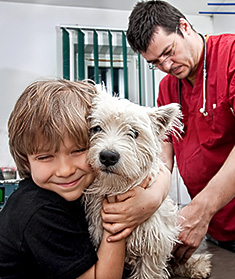
If your puppy shows any of these signs of anaphylaxis you should take it to the vet for immediate care. Anaphylaxis is a life-threatening emergency and requires a prompt medical response.
At this time you puppy should have a fecal exam. This exam checks for intestinal parasites and is performed with a microscope. When you take your puppy in for the third shot remember to take in a fresh sample of your puppy’s feces.
Also at twelve to thirteen weeks your puppy will need a vaccination for Bordetella. Bordetella has a bacterial and viral form and spreads through the air. This disease causes a condition called “kennel cough “. Your puppy can be exposed if you go to a dog park or somewhere else with other dogs. This vaccination is usually given at the same time as the DHLLP shot.
There are two ways to vaccinate for Bordetella. The vaccine can be injected under the skin, or there is an intranasal form that is squirted into the puppy’s nostrils.
Allergic reactions to the intranasal vaccine include sneezing, fever, nasal discharge or coughing from four to seven days after the vaccination. It is uncommon for the injected Bordetella vaccine to cause anaphylactic shock, but it can occur – usually within minutes of the injection. Anaphylactic shock requires immediate treatment with epinephrine.
Rabies
At four months your puppy will get a rabies shot. The law is different depending on where you live, but your vet can let you know what’s required. Rabies is a virus and attacks the brain and nervous system of mammals.
It is transmitted by the saliva of rabid animals and can be absorbed through cuts, bites or scrapes. Rabies is always fatal in an unvaccinated animal. Rabies vaccinations will require a booster the following year.
Allergic reactions to rabies vaccinations can occur immediately after administration or a full 24 hours. Anaphylaxis may occur, causing a weak pulse, vomiting, fever, rapid heartbeat or diarrhea. Your puppy may become unconscious in severe cases. If this happens see your vet immediately.
Another side effect of the rabies vaccine is autoimmune diseases. These cause the puppy’s blood cells or organs to be attacked by the immune system. Autoimmune diseases take months to develop. Remember, side effects from rabies vaccinations are very rare. The risks should be discussed with your vet.
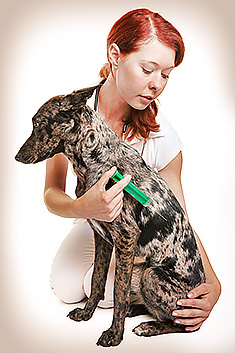
Spay or Neuter Your Puppy
The last thing that needs to be taken care of at the four month mark is surgery to spay or neuter your puppy. Spaying or neutering your puppy is required in some cities. Both male and female dogs tend to be better pets if they have been sterilized.
Males may have less desire to mark territory – saving your furniture and carpeting – and be less driven to roam.
Females won’t go into heat every six months or so if spayed. The heat cycles that female dogs go through bring hormonal changes that can lead to personality changes. If you don’t spay your female puppy you will have to keep her locked up to keep her from getting pregnant.
At six months old your puppy needs a test for heartworms. Heartworms are spread by mosquitoes. The heartworm parasite lives in the blood and blood will have to be drawn for this test. Heartworms can be fatal, so make sure you get this test completed.
The first six months
...are very important to you and your puppy. The vaccinations and procedures discussed above – including spay or neuter surgery – will help keep your puppy grow into a health adult.
There are two treatments your puppy will need on a monthly basis and they will be necessary on into the adult life of your dog. They are flea and tick treatment and heartworm preventative.
- Fleas can spread Lyme disease.
- Ticks can carry Rocky Mountain spotted fever.
Monthly treatments for your puppy and grown dog are the best way to keep your pet free of fleas and ticks. Even a puppy that is indoors all the time can get fleas. Discuss with your vet the best treatment for your puppy. Many flea and tick treatments can be given at home, saving a monthly trip to the vet.
Heartworm preventatives are usually a pill or treat that you give to your pet. The treats come in a variety of flavors so you can pick one your puppy will like. Your vet can help you pick the correct type of preventative for your puppy.
In most cities the only required pet vaccinations are for rabies. An annual booster is a good idea even if not required by law. This booster will protect your pet from rabies for another year.
Annual boosters are also given for DHLPP - Distemper/Hepatitis/Leptospirosis/Parainfluenza/Parvovirus – and Bordetella. These diseases threaten adult dogs as well as puppies and need to be kept up.
Another requirement to keep your grown up puppy healthy is an annual exam for internal and external parasites. When you go to the vet for this remember to take a fresh fecal sample.
Follow this schedule and your puppy will grow into an adult dog that will be a healthy and alert companion for many years.
Read more about Vaccinations below:
Doggies Den: Latest Articles
 Homemade Thanksgiving Treats for Your Dog
Homemade Thanksgiving Treats for Your Dog
NUTRITION We all want to include our dogs in our holiday celebrations, but hopefully, you're aware that sharing table scraps with your dog isn't always the best idea.
 Keeping Your Dog Safe during the Summer Months
Keeping Your Dog Safe during the Summer Months
HEALTH Summer is coming on fast, so it’s time to plan how you will keep your dog safe and healthy through the lazy, carefree, warm days.
 Vaccination Time Again-Keeping Your Puppy Healthy
Vaccination Time Again-Keeping Your Puppy Healthy
DOG HEALTH So you have your new puppy picked out. There are quite a few shots, treatments and examinations that will keep the newest member of your family healthy.
 Canine Thanksgiving Feast
Canine Thanksgiving Feast
NUTRITION With the wide variety of food at Thanksgiving dinner, chances are you'll want to give your dog something special, too. If you're contemplating what to feed your dog for the holiday, here is a guide to a great Canine Thanksgiving Feast.
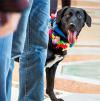 Dog Walking Tips Every Owner Should Know
Dog Walking Tips Every Owner Should Know
DOG FUN Walking your dog is not only crucial to keeping him healthy and happy, it strengthens the bond between your canine friend and his caregiver. There are a lot of obstacles out there. Don’t forget these simple tips to keep your walk fun and safe in the outside world.
 The Benefits of Physiotherapy for your Dog
The Benefits of Physiotherapy for your Dog
HEALTH The same techniques that physiotherapists use to treat a variety of injuries and conditions in humans have been adapted to suit animals with great success. Family pets, show dogs, and working dogs can all benefit greatly from physiotherapy. Dogs whose activities involve a lot of agility are especially susceptible to the types of problems that physiotherapy can address.
 The Decision- Adding a Dog to Your Family
The Decision- Adding a Dog to Your Family
FIRST TIME OWNERSBringing a dog into your family is a decision where many people don’t realize it’s magnitude until after they have the dog. There are a number of things that you need to research before you decide to purchase a dog, and it starts right in your own home.
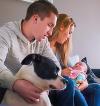 Bringing Your Dog Into Your New Baby's Life
Bringing Your Dog Into Your New Baby's Life
HEALTH Many believe that a dog and a new baby cannot happily coexist, so therefore the dog has to go. This is not necessarily the case.  A new baby does not mean you have to abandon your dog.

Doggies Den:
Most Popular Articles
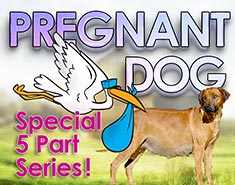
Dog Pregnancy Symptoms
HEALTHIf you suspect your dog might be pregnant, check out part one in this series on pregnant dogs, where we cover pregnant dog symptoms.
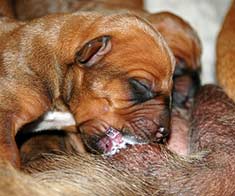
Dog Birth
HEALTHIn the third article of our dog pregnancy series, we look at the wonderful, but messy, process of bringing newborn puppies into the world.
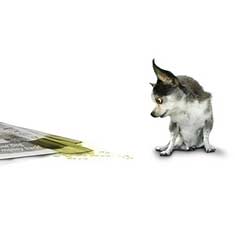
Indoor Dog Potties
DOG PRODUCTSIt's been a long day at work. You were so busy, you didn't even take time to eat a sandwich, let alone run home to let your dog out. You're on your way home, knowing the poor dog is crossing his or her legs by now, when your car breaks down, delaying you even further. Can't somebody make this easier?
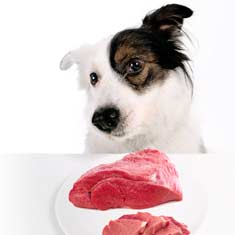
Your Dog’s Digestive System
PHYSIOLOGYEver wonder why your dog eats so fast? Or why he eats gross things? Or why he gets sick to his stomach? Or why his waste stinks so bad? Some of these things are normal, some are not.

Canine Respiratory System
BREATHINGThe basic function of your dog's respiratory system is to bring oxygen in to and remove carbon dioxide from the body. Knowing the symptoms of respiratory diseases can help you help your stay healthy.
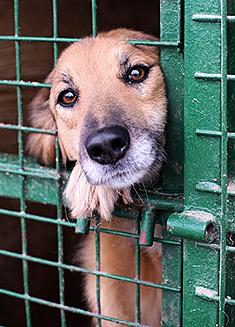
Shelter Dog Adoption Tips for Success
ADOPTION Are you intimidated by the prospect of "rescuing" a dog from a shelter? One reason that you may be wary of adopting a dog from a shelter is not knowing how to choose. Adopting a dog from a shelter can be a rewarding process, if you're prepared to do a reasonable amount of research.
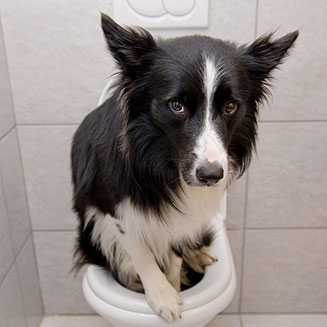
Canine Urinary Tract Infections
SYMPTOMS AND TREATMENTDoes your dog seem to be having trouble relieving his or her bladder? Learn how to recognize the signs of urinary tract infections and how to treat them before they spread.
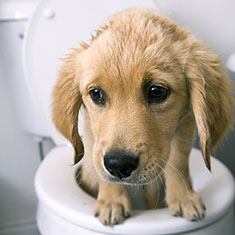
What to do for Dog Diarrhea
SYMPTOMS AND REMEDIESIf you have dogs in your house for any length of time, you have likely experienced at least one bout of dog diarrhea. Beyond the pain in the tuckus involved in cleaning up the mess, you should know what causes diarrhea, and when it's important to see the vet.
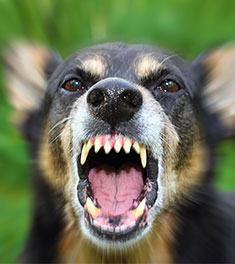
What to do for a Dog Bite
DOG BEHAVIOR Getting bitten by a dog can be scary, and you may be tempted to run around in circles for a while, trying to figure out what to do. Here's our guide to help you manage the situation.
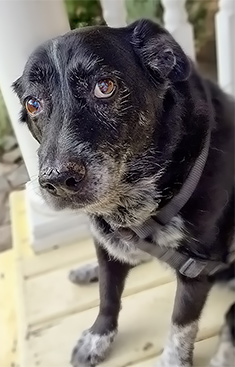
Top Ten Tips for Living with a Senior Dog
DOG HEALTH Bringing home a new puppy is so exciting, but it doesn’t take all that long for your exuberant puppy to grow into a senior dog who may have special needs. Here are the doggies.com top ten tips for taking care of your companion who has been with you through so much.
